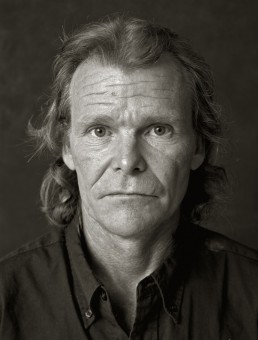Podcast Season 2: Hunger & Resilience
S2: Episode 19 - Dale

Episode Information
[Intro Music]
Narrator: Welcome to Hunger and Resilience, narrative histories about the complexity and experiences of hunger. A traveling exhibition and weekly podcast edited and hosted by Michael Nye, supported by the San Antonio Food Bank, Eric Cooper, executive director. We are grateful for the honesty and eloquence of every voice. Episode 19, Dale.
Dale: You never know what’s gonna happen in life to my thinking, it was a Friday afternoon I was drinking. Buddy of mine come over and we was drinking heavy together. We got into an argument. He jumped, and I jumped, and we started swinging. I reached over and picked up a small knife and stabbed him. He spent three hours on the operating table, saving his life. What I couldn’t believe is that I could stoop so low as to, to hurt someone like that. The judge told me, he says, Mr. Parsons, it hurts me to have to do this because of your reputation in town. You’re a hard worker. The witnesses even say that, but he says, I’m gonna have to sentence you to five years in the penitentiary. Prison doesn’t start with a door slamming. Prison starts when you get on that bus and they handcuff your hands and they shackle your feet. The first night that you’re in, in that cell by yourself, and you’re laying there, there ain’t nobody in there but you. And air.
I did my time when I was in the penitentiary, and I didn’t complain about it. I, I’ve tried to make a good thing out of a bad situation. I went to school. I, uh, worked. I thought about how I could restructure my life when I got out. I thought about it every day in the country where I come from, I used to have to slop the hogs. You know, everything that a country boy has to do, feed the chickens or work the garden. I just knew what I had to do when I got outta school. You know, a lot of people won’t work, but it doesn’t bother me to get up in the morning and go to work. It taught me discipline. It taught me respect.
When I got outta prison, I just knew that it was gonna be hard, and I didn’t know nothing about the streets. All I knew how to do was work, and that’s all I wanted to do was work. When you apply for a job and they put that box up there, says, are you a convicted felon? And you have to mark, yes, the interview is over. Nobody wanted to hire a felon. Some days I picked up beer cans outta trash cans. I made $25 one day. I slept under bridges. I slept in the woods when I was the most hungry. I wanted to eat beans, something that would stick with me. It’s just, it’s, it’s, it’s just miserable to be hungry. It, it is.
I define hunger. Not going one day without eating, but to me, hunger is when you go two or three days without eating, when you get weak, you get depressed. You wish a lot. You, you pray a lot. Hunger’s not only just stomach pains, it’s emotional pain too. It’s losing hope. You’d wake up in the mornings and you’d think, why not just lay here? Maybe just wheel yourself to death. But you know, you have to get up and put one foot in front of the other. You’re not gonna go nowhere. I was picking up beer cans one day, and this guy walked up to me. He goes, picking up you some cans, huh? I said, yeah. And he goes, well, you’re just a bum. I turned and walked off. I stopped and I sat down for a few minutes and I thought, well, maybe you right anyway.
I just said, I gotta do something. Maybe that was kind of a turning point for me. One morning I was, uh, sitting at the Stew pod having coffee. I looked up and saw the bulletin board. It said, we will help find you a job. I stayed in the, uh, work program for three and a half months, and the Stew Pot got me an interview with the North Texas Food Bank for a maintenance man. I talked to a director of operations, and the next morning he called and he hired me. I’ve never had a job like this before in my life. The people there, they don’t look down on me for what I’ve done. They don’t ask about it. I’m just Dale to them. Not only do I get to help people, but also can help myself feed myself, and it gives me my pride back. This job I have means everything to me. It’s my livelihood, it’s my family. It, I would rather be at work than at home.
[Outro Music]
Host: Every story involving the experience of hunger is solitary, unique, private, and uninvited. Most individuals I met talked about feeling overwhelmed and feeling invisible. These narratives are about understanding and about our shared humanity. I want to thank Dale for his openness, his voice, and his presence. I’m Michael Nye. You can go to my website, michaelnye.org/podcastfor photographs and transcripts. Thank you for listening.
